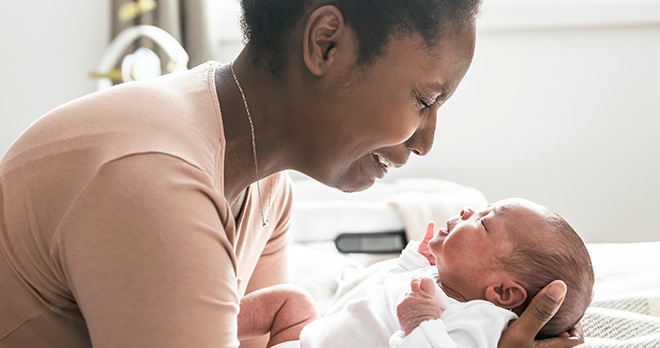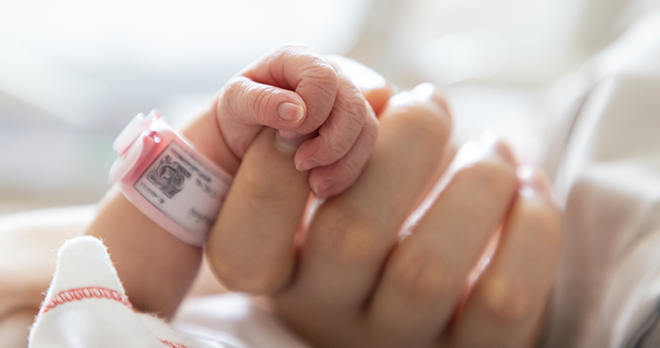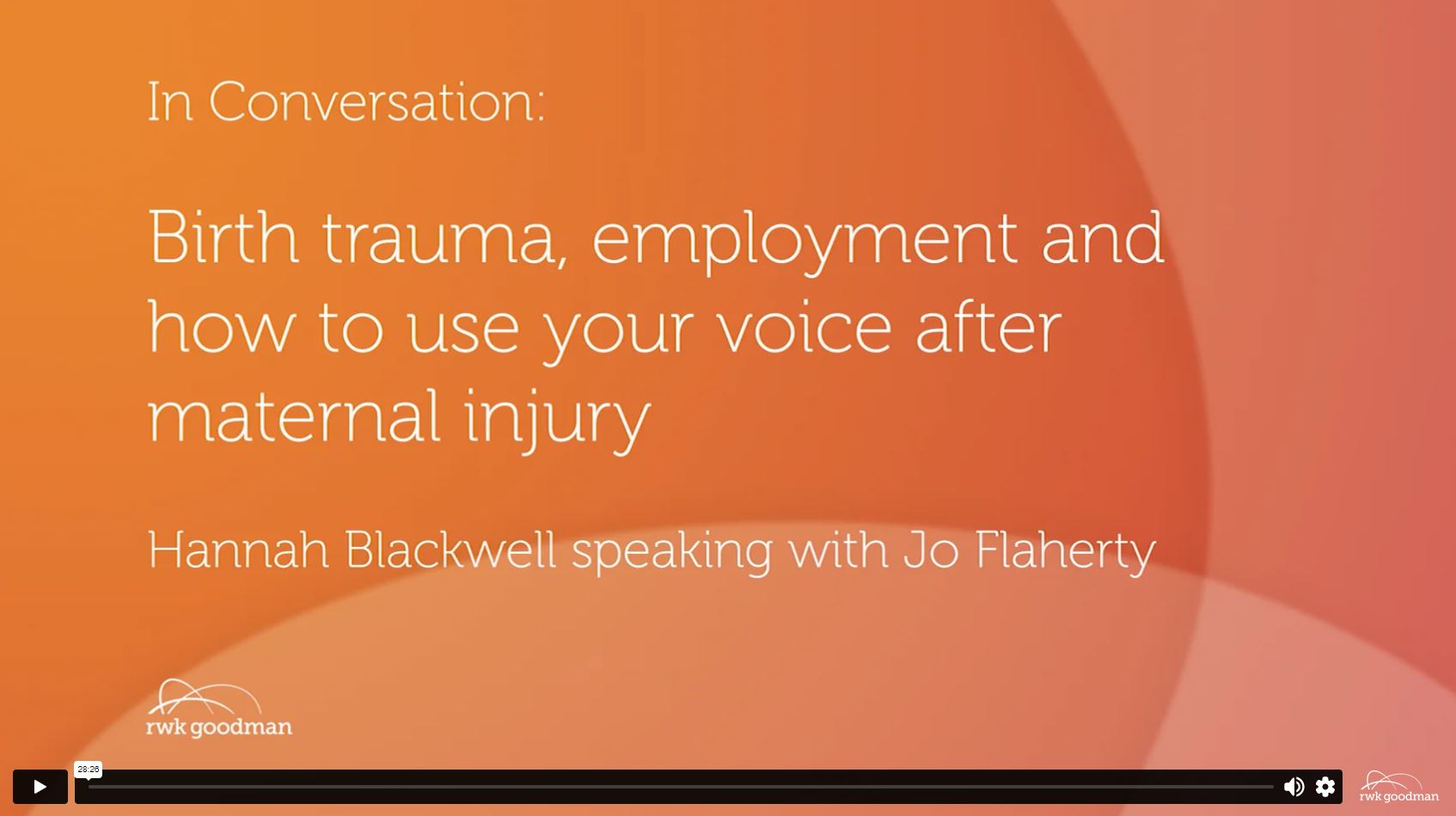Are the aims of the Montgomery case being met by maternity professionals?

As a maternal injury solicitor trying to raise awareness of the challenges faced by mums during pregnancy and childbirth, I read the recent research into, ‘Consent in pregnancy - an observational study of ante-natal care in the context of Montgomery: all about risk?’ with interest.
The research looks at how best to support pregnant women in making truly autonomous decisions which accord with their legal rights, but ultimately concludes that the process is poorly understood and problematic for both expectant mothers and healthcare professionals.
This doesn’t just reflect what my clients often tell me but also mirrors what we found when we reached out to women aged 18 to 45 across England and Wales who had had children in the last five years, in our survey – “What About Mum”?
Our survey’s insights
Our survey revealed that the majority of mums have a good experience of childbirth. However, a substantial minority did not get the support they needed.
One of the areas our survey focused upon was whether the women felt prepared for childbirth and whether the risks to themselves were adequately explained. Nearly 36% of all respondents in our survey did not believe they had all the risks explained to them in preparation for childbirth.
The statistic was worse for mums who gave birth in the last 18 months, falling from 67% to 62% of mums saying they felt they had all the risks explained to them.
Later in our survey, we also asked mums which areas of care they feel could improve. 41% stated that they wanted more information on birthing options, and nearly 35% said they wanted more of an explanation as to the risks to themselves.
The experience of our clients
This was certainly the situation for Joanne Flaherty, who I represented.
Jo suffered a fourth degree tear at the time of the birth of her first child in January 2005 and this had life-changing implications for her. When she recently reflected upon the discussions that took place around how she would deliver her baby, she commented:
“I can genuinely say that in the majority of my appointments and discussions with health practitioners were more to do with birthing plans, etc. The only time that we did have discussion about birthing risks was when they identified my son was a large baby, but outside of that I can say that I did not even have any knowledge as to how bad injuries could be, particularly in childbirth.”
The recent research, carried out by expert in obstetric care Dimitrios Siassakos and others, notes doctors/midwives are required to;
“Take reasonable care to ensure that the patient is aware of any material risks involved in any recommended treatment and of any reasonable alternatives to variant treatment.”
However, since Jo gave birth to her first child in 2005, a landmark decision was made in the case of Montgomery –v- Lanarkshire Health Board in 2015 which stated that it is necessary for doctors/midwives to advise patients about alternative options and risks which may be material to their particular individual circumstances. It endorsed a patient having a central role in decision making. However, the findings of the survey suggest that, whilst the right boxes are ticked, the aims of the judgment in this case may not be met in all cases.
The Montgomery case – what you need to know
Nadine Montgomery pursued a clinical negligence case on behalf of her son who suffered a lack of oxygen at the time of his birth causing him to suffer a brain injury.
Nadine’s case was based on the premise that it was care below a reasonable standard to have allowed a diabetic woman of short stature with a macrocosmic foetus (a baby much larger than average) in ‘early trial of labour’, whose foetal heart rate was grossly abnormal, to continue in labour and attempt a vaginal delivery; or fail to consider offering delivery by caesarean section.
Nadine Montgomery succeeded in her case and, as mentioned above, the judge involved made it a legal requirement for clinicians to advise expectant mothers about alternatives and risks which made them material to their particular individual circumstances.
We might therefore expect the Montgomery case to have led to expectant mothers making more informed decisions about childbirth. However, this was not something we found either in our survey or something noticed in the research.
How this research asks “what about mum?”
The research observed 16 consultations between pregnant women and their healthcare professionals. Antenatal interventions were discussed and consent was documented.
There were four main themes:
1 - Consultations were very clinical, and left little opportunity to ask mums how they felt – by framing the consultation in terms of the clinical decision to be made, the midwife or doctor missed the opportunity to assess what really mattered to a pregnant woman. The study noted that for some women, the opportunity to feel that their previous experiences had been ‘heard’ was an important, but sometimes neglected, prelude to the ensuing consultation.
2 - Clinical risk dominated narrative, and all alternatives were not discussed – all consultations were dominated by information related to risks; discussion of reasonable alternatives was not always observed and women’s understanding of information was seldom verified, making compliance with the legal requirement of autonomy questionable. oOcasionally, some risks were described as ‘never a problem’.
3 - Woman-centred narrative – for pregnant women, social factors such as the place of birth and partner influences were as or more important than considerations of clinical risk, yet were often missed by doctors and midwives.
Some women referred extensively to a traumatic previous experienced. They sought acknowledgement of this trauma and recognition that it was a significant influence on the current pregnancy and something they were anxious to avoid repeating. The study notes that doctors and midwives varied in their response. In some, the midwives barely acknowledged the previous experience, preferring to focus on the current pregnancy to the evident frustration of the expectant mother, and this apparent ignoring of their experience shaped the remainder of the consultation.
4 - More consistent dialogue is needed - researchers observed considerable variability in the nature of shared decision-making in terms of the roles played by doctors/midwives and women.
Some consultations were characterised by a strong dialogical exchange in which both parties appeared to exchange ideas freely. Conversely, in other consultations, the role of the doctor or midwife was essentially that of an information provider. In some cases, women would try to be more actively involved, but were discouraged from doing so.
So, what needs to be change?
The study notes that promoting autonomous decision-making requires doctors and midwives to appreciate what matters to an individual pregnant woman in a wide and particular way. Yet none of the consultations observed explicitly addressed a woman’s values and preferences, which seems an essential foundation if consultations are to meet legal requirements set out in the case of Montgomery.
The study concluded that following on from the Montgomery case, antenatal consent remains pretty much dominated by clinical risk and numerics, and not by what patients and their families consider important.
Future initiatives should take this understanding further, to processes and tools that support both patients and their families to discuss their priorities and concerns, and in turn healthcare professionals to be able to provide “supported decision-making” and not just longer lists of risks in fear of litigation.
The study certainly echoes what clients often say to me and the results produced in our recent survey – women clearly aren’t being consistently asked “what about mum?” when preparing to give birth.
There is clearly a difficult balance to be struck; clinicians need to ensure that women have the information needed in order to make the decision that is right for them, but at the same time are no doubt conscious not to unduly scare expectant mothers. However, having an open dialogue to discuss any anxieties that mums may be facing ahead of their birth will not only further fulfil the aims of the Montgomery case ruling but could also do more to help improve mental health care for women who are expecting.
There is clearly a need to ensure what is important to individual mothers is understood and discussed to ensure the decisions reached are autonomous and expectant mothers make the decision that is right for them.
If you have experienced an injury during childbirth, and think your treatment was negligent, we’re here to help.
Call now








